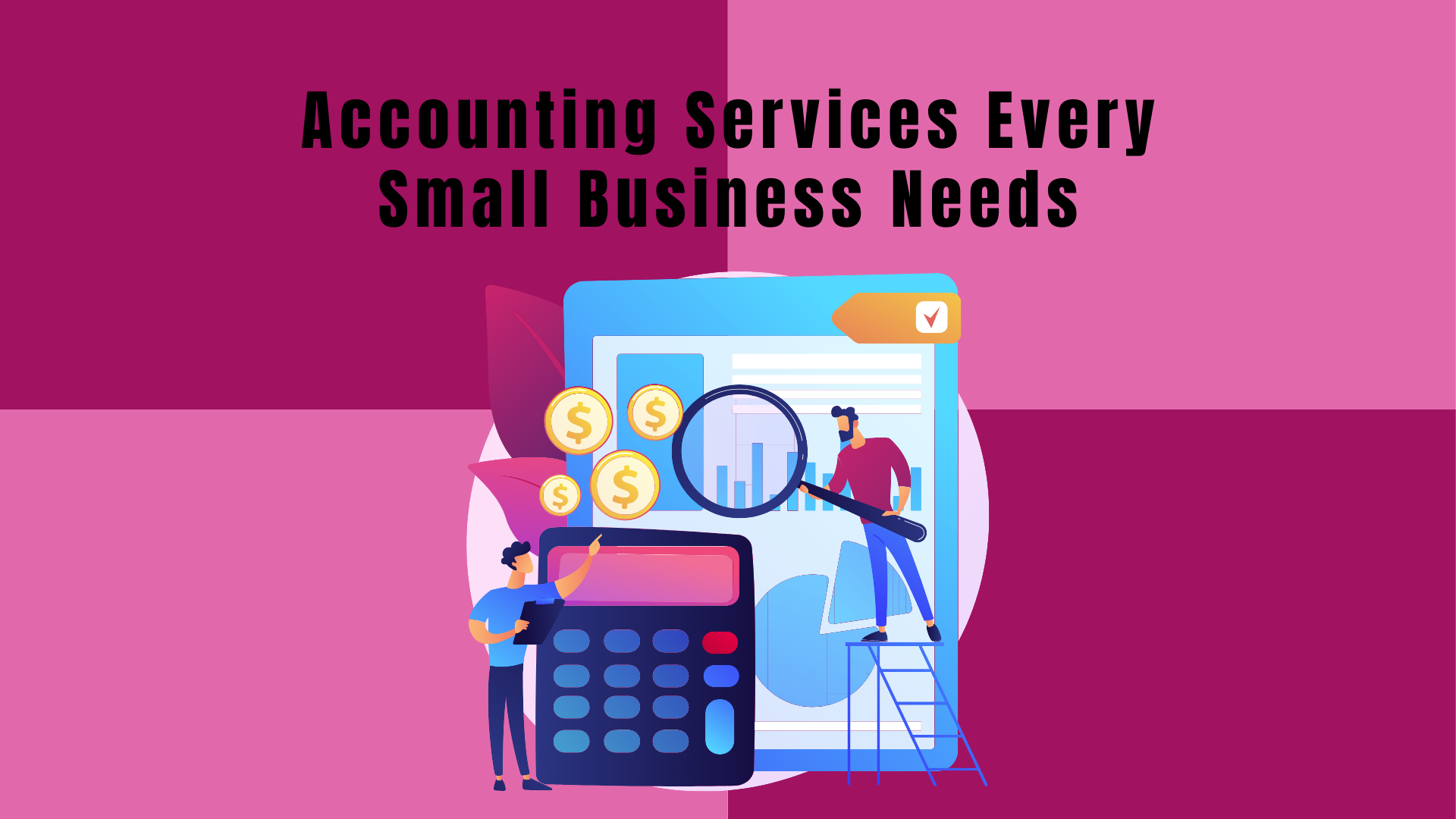Introduction
Running a successful small business hinges on effective financial management, and at its core are essential accounting services. These services are integral to maintaining precise financial records, adhering to regulatory requirements, and making informed business choices. In this article, we delve into seven vital accounting services that every small business should prioritize.
Firstly, bookkeeping forms the bedrock of financial stability by meticulously recording income, expenses, and transactions, providing a real-time snapshot of the business’s financial health. Financial statement preparation is equally indispensable, with accountants crafting key documents like income statements, balance sheets, and cash flow statements that offer invaluable insights into profitability and financial standing. Additionally, tax planning and compliance services ensure that businesses remain on the right side of tax regulations while optimizing deductions and credits, preventing costly penalties or audits. Budgeting, payroll management, financial analysis, and auditing further reinforce the financial stability and growth potential of small businesses. Partnering with qualified accounting professionals is a wise step toward ensuring the long-term success of your enterprise.
Bookkeeping Services
Bookkeeping services are the cornerstone of effective financial management for any business, regardless of its size. They play a pivotal role in ensuring the accurate recording and organization of financial transactions, which is crucial for maintaining financial transparency and making informed decisions. Let’s expand on the significance and benefits of bookkeeping services:
- Financial Clarity and Health:
Bookkeeping provides a clear and up-to-date picture of your business’s financial health. By meticulously recording every financial transaction, from sales and purchases to expenses and receipts, bookkeepers create a comprehensive financial trail. This transparency enables you to understand your business’s profitability, cash flow, and overall financial position at any given moment. - Informed Decision-Making:
Accurate bookkeeping empowers business owners and managers to make informed decisions. With a solid financial foundation, you can analyze historical data to identify trends and patterns, helping you anticipate future financial needs and opportunities. Whether you’re considering expanding your operations, hiring new staff, or investing in equipment, having reliable financial data at your fingertips is invaluable for making the right choices. - Budgeting and Planning:
Effective budgeting is a critical aspect of financial management, and bookkeeping is essential for this process. By tracking income and expenses, you can create realistic budgets that align with your business goals. This not only helps control costs but also ensures that you allocate resources efficiently to achieve your objectives. - Tax Compliance:
Accurate bookkeeping is fundamental for tax compliance. When tax season arrives, having organized financial records streamlines the process of preparing and filing tax returns. It also minimizes the risk of errors and potential audits, as you can easily provide documentation to substantiate your financial transactions. - Cash Flow Management:
Maintaining a healthy cash flow is vital for sustaining day-to-day operations and supporting business growth. Bookkeeping allows you to monitor incoming and outgoing funds, helping you identify any potential cash flow challenges before they become critical. This proactive approach enables you to make adjustments as needed to ensure your business’s financial stability. - Credibility and Transparency:
Accurate bookkeeping enhances your credibility with stakeholders, including investors, lenders, and potential partners. It demonstrates your commitment to transparency and responsible financial management, which can be attractive to external parties looking to collaborate or invest in your business.
Tax Preparation and Planning
Tax preparation and planning are essential components of small business financial management. These services are integral for ensuring compliance with tax regulations, minimizing tax liabilities, and optimizing a business’s financial position. Let’s delve deeper into the significance and benefits of professional tax preparation and planning:
- Compliance with Tax Regulations:
Tax laws and regulations are complex and subject to frequent changes. Staying compliant with these laws is crucial to avoid penalties, fines, or audits. Professional accounting services specialize in tax compliance, ensuring that your business meets all its tax obligations, including income taxes, payroll taxes, sales taxes, and more. They keep abreast of tax code changes and ensure that your tax returns are accurate and submitted on time. - Maximizing Deductions and Credits:
Accounting professionals are well-versed in tax deductions and credits available to businesses. They can identify opportunities for cost savings by ensuring that you take advantage of all eligible deductions and credits. This not only reduces your taxable income but can also lead to substantial savings that can be reinvested in your business or used for growth. - Effective Tax Planning Strategies:
Tax planning is about looking ahead and developing strategies to minimize tax liabilities while achieving your financial goals. Accountants can work with you to create a tax-efficient business structure, optimize depreciation schedules, and time income and expenses strategically. They can also advise on decisions such as when to make major purchases or investments to maximize tax benefits. - Cash Flow Management:
Effective tax planning can positively impact your cash flow. By managing your tax liabilities and payments, you can avoid cash flow disruptions that may arise from unexpected tax bills. Accountants can help you set aside the right amount of money for taxes, ensuring that you have the necessary funds when tax payments are due. - Reducing Risk and Audit Preparedness:
Accurate and well-documented tax preparation reduces the risk of errors or discrepancies that could trigger audits or investigations. In the event of an audit, having professional tax records and documentation can help defend your position and facilitate the audit process. - Strategic Decision-Making:
Tax considerations often play a significant role in business decisions. Whether you’re contemplating expansion, mergers, acquisitions, or changes in ownership, accountants can provide insights into the tax implications of these decisions. This allows you to make informed choices that align with your business’s financial objectives. - Long-Term Financial Planning:
Professional tax planning is not just about the current tax year; it’s about creating a long-term financial strategy that maximizes your business’s financial stability and growth potential. Accountants can help you set financial goals, monitor progress, and adapt your tax strategies as your business evolves.
Financial Analysis and Reporting
Financial analysis and reporting play a pivotal role in helping small businesses thrive and make informed decisions. These services involve examining financial data to gain a deeper understanding of a company’s performance, strengths, weaknesses, and areas for improvement. Here, we will explore the significance and advantages of financial analysis and reporting with the assistance of accounting services:
Conclusion
Effective financial management serves as the cornerstone of small business success. Small businesses that embrace the essential accounting services discussed in this article gain a competitive edge in today’s dynamic and challenging business environment. These services go beyond mere financial record-keeping; they empower entrepreneurs to make data-driven decisions, maintain regulatory compliance, and steer their businesses toward financial stability and growth.
By investing in professional accounting services, small businesses can maintain the accuracy and integrity of their financial records. This precision is crucial for evaluating their financial health, tracking income and expenses, and ensuring that every dollar is accounted for. With accurate financial data at their disposal, business owners gain the confidence to make informed decisions, whether it’s budgeting, pricing strategies, or investment opportunities. These decisions are essential for aligning their business operations with long-term goals.
Furthermore, compliance with tax regulations and financial standards is non-negotiable for small businesses. Accounting professionals can navigate the complexities of tax codes and regulatory requirements, ensuring that businesses meet their obligations without the risk of fines or audits. This compliance not only protects the business but also enhances its credibility with investors, lenders, and other stakeholders. In sum, by partnering with professional accounting services, small businesses can optimize their financial processes, make informed decisions, and set themselves on a path toward long-term growth and prosperity.





